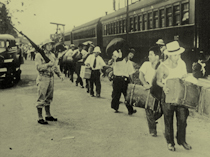

Panama Canal Zone: Japanese Peruvians en route to U.S. Internment Camps. April 2, 1942. U.S. Army Signal Corps Photo. National Archives. Courtesy of National Japanese American Historical Society.
CFJ Brochure – English,
Japanese, Spanish
Bibliography
FAQ
Commission Bill
Books
Videos
Photo Gallery
Exhibits
Media Room
Speeches
Archives
Litigation Archives
Newsletters
Past Events
| Join Our Mailing List |
Campaign for Justice
P.O. Box 1384
El Cerrito, CA 94530
(510) 528-7288
info@campaignforjusticejla.org
|
Speeches CFJ Redress Update By Grace Shimizu, Campaign for Justice Over 60 years ago, the US government perpetrated one of the worst constitutional violations in US history against the JA community. And it took over 40 years for the US government to grant redress to our community: an apology letter, compensation payments and a one-year of educational funding. The US government wants us to believe that redress is over. And many within our own community and the public think so because the Japanese American redress legislation got passed and most Japanese Americans got their apology letters and compensation checks. But the struggle for truth and justice is still being waged. And the US government is still fighting former internees and our community in the courts and in the halls of Congress. The fight has even gone international because the Japanese Latin Americans have not found justice through the US courts. But this chapter on WWII internment and redress is not closed. It should not be closed. It must not be closed. How can it be closed, when there are over 1200 Japanese Americans and Japanese Latin Americans who have not yet received proper redress for the violation of their constitutional and human rights. For the Japanese Latin Americans, the violations rank as war crimes and crimes against humanity. And what about the $45 million in education and research funding that the US government still owes the American people? The educational mandate under the Japanese American redress legislation has not been fulfilled. And we all know that today this country needs that money for ongoing education more than ever. We cannot let this chapter be closed. We are only now hearing about wartime violations experienced by the German and Italian American communities. Did you know that thousands of immigrants and US citizens from these communities were also forcibly relocated under EO 9066? Did you know that Germans and Italians were arrested and interned without due process, some in the same enemy alien camps that held Japanese Americans? And did you know that, in addition to the 2200 Japanese Latin Americans who were kidnapped, there were also over 4000 men, women and children of German and Italian ancestry from Latin America who were forcibly brought to the US for internment and hostage exchange? This chapter on WWII internment and the struggle for redress must not be closed because history is being repeated. This time other communities are being scapegoated and under attack as the “enemy.” And, once again, we see the gutting of our Constitution for both immigrants and citizens in the name of “national security.” So what can we do? I’d like to tell you about an exciting event coming up which can push forward our work for acknowledgment and redress and assist in the preservation of our civil and human rights. Please join us at “The Assembly on Wartime Relocation and Internment of Civilians” which will be held on Friday, April 8 and Saturday, April 9 at Hastings College of the Law in San Francisco.
The purpose of this Assembly is to document these hidden stories of US citizens and immigrants of Japanese, German and Italian ancestry in the US and from Latin America who have not yet received proper acknowledgment nor redress for the violation of their civil and human rights. We are seeking testimony from the following categories of people: --US citizens born in camp after the erroneous cutoff date of
the original redress legislation If you are one of these people, or are a relative, or perhaps have some other experiences we have not heard about, we need your help to complete the historical record. We are looking for people who can make statements (both written and spoken) about their little known wartime experiences. We are also looking for individuals or community organizations who can make statements about the importance of ongoing education of the WWII internment and redress experience and its relevance to present-day attacks on civil and human rights. And we want to particularly outreach to our Arab, Muslim and South Asian neighbors to share their stories with us at the Assembly, so we may understand parallels between our WWII and post-9/11 experiences. The Assembly proceedings will be documented, archived and accessible to the public. Copies of the public testimonials will be submitted to the US Congress and to an international body, the Inter-American Commission on Human Rights, for their consideration of pending and future legislation and litigation. For more information, please pick up an Assembly flyer. We invite you to come and be a witness to history and to participate in the making of history. We would appreciate any help that you can give us, including financial contributions. Please continue to support our redress efforts and join us at the Assembly on April 8 and April 9th in San Francisco. Thank you. |
HOME | WHO WE ARE | WHAT WE DO | GET INVOLVED
RESOURCES | HISTORY | MEDIA ROOM | LINKS
Contact: Campaign for Justice